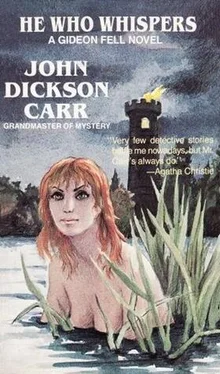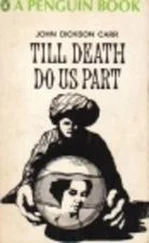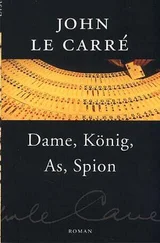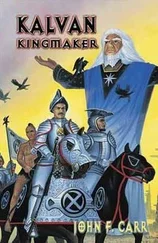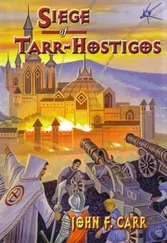The opening of the door poured yellow light into the hall. Georges Antoine Rigaud, in his shirt-sleeves, regarded them in a state of near-raving.
“I tell you,” he cried out, “I cannot keep this woman's heart beating much longer. Where is that doctor? Why does not that doctor arrive? What is delaying . . .”
Professor Rigaud checked himself.
Past his shoulder, past a wide-open door, Miles by moving a little could see into the bedroom. He could see Marion, his own sister Marion, lying on a still more tumbled bed. The .32 revolver, useless against certain intruders, had slipped off the bed onto the floor. Marion's black hair was spread out on the pillow. Her arms were thrown wide, on sleeve pushed up where a hypodermic injection had been made in the arm. She had the aspect of a sacrifice.
In that moment, by a single gesture, terror rushed on them out of the New Forest.
For Professor Rigaud saw Fay Seton's face. And Georges Antoine Rigaud—Master of Arts, man of the world, tolerant watcher of human foibles—instinctively flung up his hand in the sign against the evil eye.
Chapter XII
Miles Hammond dreamed a dream.
Instead of being asleep at Greywood, on that Saturday night passing into Sunday morning—which was actually the ease—he dreamed that he was downstairs in the sitting-room, at night under a good lamp, seated in any easy-chair and taking notes from a large book.
The passage:
“In Slavonic lands popular folklore credits the vampire with existence merely as an animated corpse: that is, a being confined to its coffin by day, and emerging only after nightfall for its prey. In Western Europe, notably in France, the vampire is a demon living outwardly a normal life in the community, but a demon living outwardly a normal life in the community, but capable during sleep or trance of projecting its soul in the form of straw or spinning mist to take visible bodily shape.”
Miles nodded as he underscored it.
“ 'Creberrima fama est mulique se expertos uel ab eis,' to quote a possible explanation of the origin of these latter, 'qui experto exxent, de quorum fie dubitandum non esset, audisse confirmant, Sluanos et Panes, quos uulog incubos uocant, improbos saepe extitisse mulieribus et earun adpetisse ac ergisse concubitum, ut hoc negare impudentiae uideatur.' ”
“I shall have to translate this,” Miles aid to himself in his dream. “I wonder if there's a Latin dictionary in the library.”
So he went into the library in search of a Latin dictionary. But he knew all along who would be waiting there.
During his work at Regency history Miles had for a long time been captivated by the character of Lady Pamela Hoyt, a sprightly court beauty of a hundred and forty years gone by, no better than she should be, and perhaps a murderess. In his dream he knew that in the library he would meet Lady Pamela Hoyt.
There was as yet no sense of fear. The library looked just as usual, with its dusty uneven piles of books round the floor. On one pile of books sat Pamela Hoyt, in a broad-brimmed straw hat and a high-waisted Regency gown of sprigged muslin. Across from her sat Fay Seton. Each one looked just as real as the other; he was conscious of nothing unusual.
“I wonder if you could tell me,” Miles said in his dream, “whether my uncle keeps a Latin dictionary here?”
He heard their reply soundlessly, if it can be expressed like that.
“I really don't think he does,” replied Lady Pamela politely, and Fay Seton shook her head too. “But you could go upstairs and ask him.”
There was a flash of lightning outside the windows. Suddenly Miles felt an intense reluctance to go upstairs and ask his uncle about a Latin dictionary. Even in the dream he knew his Uncle Charles was dead, of course; but that wasn't the reason for his reluctance. Th reluctance grew into terror, solidifying coldly through his veins. He wouldn't go! He couldn't go! Bu something impelled him to go. And all the time Pamela Hoyt an Fay Seton, with enormous eyes, sat perfectly motionless like wax dummies. There was a shaking crash of thunder . . .
Miles, with bright sunlight in his face, was shocked awake.
He sat up, feeling the arms of the chair on either side o him.
He was in the sitting-room downstairs, hunched up in the tapestry char by the fireplace. In a momentary backwash of the dream, wildly, he half expected to see Fay and dead Pamela Hoyt walk out of the library door over there behind him.
But here was the familiar room, with the Leonardo above the mantelpiece, and soft brilliant sunshine. An the telephone was ringing shrilly. The events of last night returned to Miles as he heard it ring.
Marion was safe. Safe, and going to get well. Dr. Garvice had said she was out of danger.
Yes! And Dr. Fell was asleep upstairs in his own room, and Professor Rigaud in Steve Curtis's: these being the only two other inhabitable bedrooms at Greywood. That was why he had dossed down here in the chair.
Greywood felt hushed, felt empty and new-washed, in a fresh morning stillness, though he could tell by the position of the sun that it must be past eleven o'clock. Still the telephone kept on clamouring on the wide window-sill. He stumbled over to to, stretching his muscles, and caught it up.
“May I speak to Mr. Miles Hammond?” said a voice. “This is Barbara Morell.”
Then Miles definitely became awake.
“Speaking,” he answered. “Are you—I asked you this once before—by any chance a mind-reader?”
“What's that?”
Miles sat down on the floor with his back to the wall under the windows: not a dignified position, but it gave him a sense of siting across from the speaker for a heart-to-heart talk.
“If you hadn't rung me,” he went on, “I was going to try to get in touch with you.”
“Oh? Why?”
For some reason it gave him extraordinary pleasure to hear her voice. There was no subtlety, he reflected, about Barbara Morell. Simply because she had played that trick with the Murder Club, it showed her as transparent as a child.
“Dr. Fell is here. . . . No, no, he's not annoyed about it! He hasn't so much as mentioned the club! . . . Last night he tried to make Fay Seton admit something, and he had no success. He says now you're our last hope. He says that if you don't help us we may b dished.”
“I don't think,” Barbara's voice said doubtfully, “you're making yourself very clear.”
“Look here! Listen! If I came in to town this afternoon, could I possibly see you?”
Pause.
“Yes, I suppose so.”
“This is Sunday. I think there's a train,” he searched his memory, “at half-past one. Yes, I'm sure there's a train at half-past one. It takes roughly two hours. Where could I see you?”
Barbara seemed to be debating.
“I could meet your train at Waterloo. Then we might have tea somewhere.”
“Excellent idea!” All last night's bewilderment swept over him. “The only thing I can tell you now is that there was a very bad business here last night. Something happened in my sister's room that seems past human belief. If we can only find an explanation . . .”
Miles glanced up.
Stephen Curtis—sober-faced, conscientiously correct from his hat to his grey double-breasted suit, carrying a rolled umbrella over his arm—Stephen Curtis, coming in at a jaunty pace from the reception-hall, caught the last words and stopped short.
Miles had dreaded telling Steve, dreaded telling the mental counterpart of Marion. It was all right now, of course. Marion wasn't going to die. At the same time, he spoke hastily to the telephone.
“Sorry I have to ring off now, Barbara. See you later.” And he hung up.
Stephen, his forehead growing faintly worried, contemplated his future brother-in-law sitting on the floor: unshaven, wild and tousle-headed.
Читать дальше
